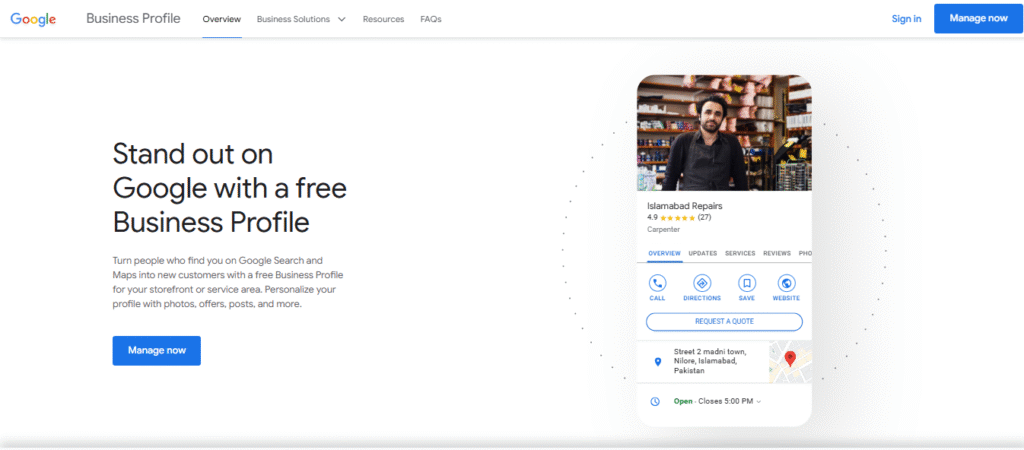
Powerful Hotel SEO Strategies to Skyrocket Your Bookings
Search engine visibility for your hotel is now a decisive factor in your business’s success in the modern digital world. Hotel search engine optimization (SEO) is now an essential element for business success.
Hotel owners of boutique inns and large resort chains will benefit from mastering hotel SEO through increased direct bookings and stronger brand recognition while reducing OTA commissions.
This guide demonstrates successful hotel SEO methods that enable properties to take control of local search results while drawing in travelers who are prepared to book instantly.
What is Hotel Search Engine Optimization?
Hotel search engine optimization involves using specific strategies to enhance hotel websites’ ranking on search engine results pages (SERPs).

SEO methods incorporate on-page and off-page strategies, which focus on drawing higher organic traffic to hotel websites without paid advertising. Through search engine optimization, hotels can attract direct traffic while decreasing advertising expenses and establishing lasting visibility.
Hotel websites can achieve top search rankings for accommodation searches by focusing on appropriate keywords, together with optimized content. The strategy supports the development of an accessible digital interface while building traveler trust.
Key Benefits of SEO for Hotels
Hotel businesses gain significant ongoing benefits through SEO strategies. Organic traffic grows as the most immediate benefit, which leads to increased direct bookings.

The Statista 2024 survey reports that organic search traffic accounts for 53% of hotel website visits. Investment in SEO by hotels results in direct booking growth ranging between 40% and 60% during their first year of implementation.
Hotels that employ SEO strategies typically reduce their paid advertising expenditure by 30–50%. SEO stands as one of the leading digital marketing investments with the highest returns in the hospitality sector.
Key benefits include:
- Increased direct bookings and reduced OTA dependency
- Search engines boost brand visibility while building trust among users.
- Cost-effective and measurable marketing
- Sustainable and consistent website traffic year-round
- Enhanced user experience and conversion optimization
Hotel SEO Strategy: How to Create One That Works
Developing a successful hotel SEO strategy requires more elements than simply adding keywords to your website. Achieving success in SEO requires a comprehensive strategy that integrates content development with site architecture and user experience optimization.

SEO requires artistic creativity and scientific analysis to achieve effective results. Achieving success depends on performing thorough research while maintaining a clear structure and consistently updating your content.
Keyword Research for Hotels
Your SEO journey starts with keyword research. This stage involves determining what your visitors search for so you can tailor your content to meet their needs.
Long-tail phrases such as “luxury spa hotel in Los Angeles” demonstrate specific queries that often result in higher conversion rates. These keyword phrases face less competition yet successfully draw in travelers who are ready to make bookings.
The following tools will help you discover relevant and high-converting keywords for your SEO efforts.
Identify competitor keywords to discover opportunities that your hotel can address. Think like a guest: What would they type into Google?
On-Page SEO Best Practices for Hotel Websites
After gathering your keywords, you should add them throughout your website’s content. Optimizing your meta titles and descriptions to contain primary search terms helps improve click-through rates.
Structured content combined with engaging headers benefits both search engines and website users. Optimized headings and metadata must be implemented on every significant page, which includes the home page, rooms section, dining area, and spa facilities.
Add alt text to your website images while implementing fast page loading and creating audience-engaging, informative text. Ensure your website contains internal links that help users navigate through your pages.
A dedicated page must be created for each major service, including restaurant, spa, and conference room, with search term optimization. Make sure URLs are clean and descriptive.
Creating SEO-Optimized Hotel Content
Fresh content is key. Regular blogging activities maintain site relevance and enable it to achieve better rankings across various keywords.
Travel-related content that fulfills user needs, such as travel tips and local guides, strengthens a website’s authority and encourages trustworthiness. Websites that provide consistent, helpful content receive rewards from Google.
Here’s a good framework:
- “Top 10 Attractions Near [Hotel Name]”
- “3-Day Itinerary for Visitors to [City Name]”
- A Guide to Organizing a Wedding at [Hotel Name]
These articles perform dual functions of improving SEO and enhancing guest experience through valuable travel information. Enhance usability and optimize rankings by connecting each post with corresponding services and booking pages.
Search Engine Optimization for Hotels: Dominate Local SEO
Local SEO helps your hotel show up in search results when travelers look for accommodations close to your location. Driving walk-ins and last-minute bookings depend heavily on this approach.

Hyper-local targeting strategies elevate your presence within both map packs and voice search results. Smartphone-using travelers gain significant benefits from this feature.
Importance of Google Business Profile
The information on your Google Business Profile (GBP) should be completely accurate and fully detailed. Your business information must include your business name, followed by address and phone number (NAP), together with your website URL.

Your hotel needs high-resolution pictures of both its interior and exterior, as well as its amenities, uploaded to its listing. Update your listing to display seasonal offers, current operating hours, and recent reviews.
Ask happy guests to submit reviews because they significantly impact local rankings. Google rewards engagement and relevance.
Local Citations and Directory Listings
When your business listing features uniform NAP details across TripAdvisor, Yelp, Booking.com, and regional tourism directories, your credibility improves.
Steps to build strong local citations:
- Ensure NAP consistency across all platforms.
- List your hotel on high-authority travel directories.
- Provide your business information to regional tourism boards and city guide directories.
- Monitor your listings through tools such as Moz Local or BrightLocal.
Technical SEO for Hotels: Optimize Performance & Rankings
Technical SEO makes sure search engines can efficiently crawl and index your website. It also improves the overall user experience.
Technical SEO serves as the essential base for your digital estate. Websites with top-notch content will still struggle to achieve good rankings without technical SEO.

Mobile Optimization and Site Speed
The majority of hotel searches are now conducted using mobile devices. When a website loads slowly or becomes unresponsive, users will leave.
Ensure your website loads fast while displaying properly on all screen sizes. Optimize your site speed by implementing lightweight code alongside image compression and using browser caching.
Page Load Time vs Bounce Rate
| Load Time (Seconds) | Bounce Rate (%) |
| Under 3 | 32% |
| 3–5 | 45% |
| 5–7 | 61% |
| Over 7 | 78% |
Source: Google/SOASTA Research
The speed of a website directly affects user satisfaction levels. Quicker load times on your website lead to higher chances of visitors staying to make a booking.
Structured Data and Schema for Hotels
Schema markup helps emphasize essential hotel details such as star ratings, room types, pricing information, and available dates.
By implementing rich snippets, search results websites can see a notable increase in click-through rates. Using schema markup enables voice search tools to comprehend and highlight your service options.
Google’s Rich Results Test allows you to verify your schema implementation for proper functionality. Structured data isn’t optional—it’s a competitive necessity.
Website Security and Indexing
Websites that use HTTPS technology build user trust and improve search rankings. Users anticipate secure internet sessions with encryption when they input personal information.
Use Google Search Console to conduct site audits regularly. Use sitemap submission to make certain important pages appear in search engine indexes. Fix crawl errors and broken links promptly.
Off-Page SEO for Hotels: Link Building Strategies That Work

Links from other websites pointing to yours serve as one of the most powerful signals for SEO.
Search engines interpret backlinks as indicators of trustworthiness. When quality websites link to your site, the credibility of your site increases.
Earning Backlinks Through Content Marketing
Create valuable and shareable content to earn backlinks. The strategy aids in search engine optimization while simultaneously strengthening brand credibility.
Tactics include:
- Partnering with travel bloggers and influencers
- Submitting guest articles to hospitality websites
- Organize events and create exclusive media packages to gain local press attention.
- Create compelling backlinks by writing comprehensive guides or research reports that offer fresh perspectives.
Only useful content will drive organic links to your website. Publish distinctive statistics or run limited travel surveys to create original content.
Online Reputation Management
The guest reviews affect both booking numbers and SEO rankings. Positive reviews boost your reputation while simultaneously enhancing your search engine rankings.
Respond to all reviews—positive and negative. Your response to customer reviews demonstrates your appreciation for feedback and establishes trust with future visitors.
Simplify the review process for guests by sending them follow-up emails or text messages. Even minor growth in review numbers can result in significant enhancements to search rankings.
Case Study: Boutique Hotel in Barcelona
A Barcelona hotel with 40 rooms achieved a 67% rise in direct bookings over half a year through:
- Optimizing its Google Business Profile
- Publishing two blog posts per month
- Earning backlinks through collaborations with local influencers
- Running a review request campaign via email
The hotel experienced an 80% increase in organic traffic along with securing first-page rankings for 12 new local keywords.
The bounce rate decreased by 25% as the session duration expanded by 1.4 minutes. The hotel achieved substantial long-term benefits through its investment in SEO.
Tracking SEO Performance and ROI

Must-Have SEO Tools for Hotels
Utilize analytics tools to monitor your performance while measuring your progress and improving your strategy. SEO tools deliver practical user behavior data and search visibility analysis.
- Google Analytics: Analyze traffic sources and user behavior
- Google Search Console: Monitor indexing and keyword performance
- Ahrefs/SEMrush: Research competitors and backlinks
- Screaming Frog: Conduct technical audits
- Hotjar: Visualize user interactions through heatmaps
Select tools that match your team’s expertise and objectives. A majority of tools provide free trial access so users can assess their performance.
Measuring Success
Choose performance indicators that have tangible effects on your financial results. SEO extends beyond rankings to encompass conversion rates and the resulting revenue.
Key SEO KPIs include:
- Organic traffic volume
- Conversion rates for bookings
- Rankings for high-priority keywords
- Bounce rate
- Average time on site
- Inbound link count
- Revenue from organic search
Set benchmarks and review these KPIs monthly. Utilize gathered insights to modify your approach, which will lead to a consistent increase in ROI.
SEO Services for Hotels: Why Your Investment Pays Off
Hotel businesses should invest in SEO services because it leads to sustained financial growth.
Increased search engine visibility leads to higher numbers of qualified leads who are prepared to make a booking. The approach diminishes reliance on Online Travel Agencies and enhances customer loyalty.

SEO creates a compounding effect over time. As your website achieves greater optimization levels, you’ll gain increasing traffic and conversions without needing to spend more on marketing.
The intense competition in the travel business means hotels need effective SEO strategies to establish enduring competitive advantages. Measurable results will emerge over time and remain sustainable and scalable.
Begin your investment journey now to see your hotel achieve natural growth in visibility, traffic, and revenue.

